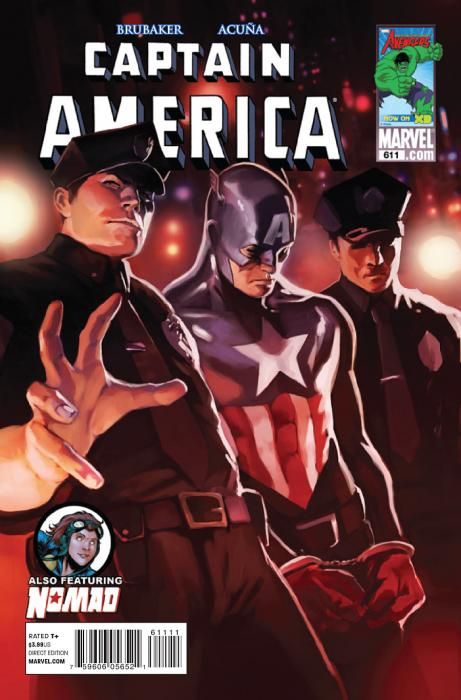"The Trial of Captain America" begins in this issue after Baron Zemo revealed the secret history of James Barnes as the Winter Soldier to the media. This issue examines the difference between the comic book and real worlds as the two butt heads. Usually, when a character has been mind controlled, it's ignored and explained away quickly. Here, the opposing view is put forth that that isn't necessarily good enough, that 'superhero comic logic' isn't good enough. Not grim and gritty in its use of 'real world logic,' this issue reminds us that, even in the Marvel universe, there's more consequences to actions than Steve Rogers vouching for someone can eliminate. James Barnes killed a lot of people and has to face the consequences if they're deemed appropriate.
The tension between those who knew about Barnes' past and those who didn't is palpable. After all, how could an assassin for the Soviet Union during the Cold War become Captain America? Even if Barnes was being controlled and not responsible for his actions, doesn't it still seem like a half-baked idea? It's an argument that's been put on the back-burner for a long time and the manner in which it's addressed here is thoughtful and hard to dismiss. After all, Steve Rogers trying to explain it all away and saying Barnes is fine now because he used the Cosmic Cube to make it all okay does sound somewhat dubious. More than that is needed to clear Barnes of his crimes and everyone seems to see that but Rogers.
In many ways, Rogers is faced with some harsh realities that simply 'knowing' something to be true isn't enough. Brubaker uses Clint Barton very well here as Rogers' counterpart, the man who's upset at the truth and questioning what it all means. It's not an indictment of Barnes; it's a questioning of things that Rogers takes for granted because of his relationship with Barnes.
In the background of this debate, another story is set up with Barnes continuing his activities as Captain America until a decision is made about his future. He takes down a Neo-Nazi hideout without too many difficulties. It's a simple problem for him to solve and provides Daniel Acuña with the chance to draw the character in action. The scene makes for a good contrast to the rest of the issue, showing that Barnes is more than capable as Captain America. But, is that enough?
Acuña handling the art for this issue is a treat for readers as he uses a more restrained color palette that fits with the regular coloring of the series, but combines that with his dynamic, bold pencils. His line work is simple and suggestive, keeping things simple with characters existing in a world of light and shadows often. Their features are defined by shadows and, otherwise, contain minimal lines.
So much of the issue is driven by characters talking and Acuña infuses those scenes with visual tension. Look at Hawkeye on the fourth page of the issue as he struggles with what to do next. It's a no-win situation and he clearly knows it.
"Captain America" #611 finally deals with issues that the book has danced around since Barnes returned as the Winter Soldier and, then, took up the mantle of Captain America. No easy answers are given, but the contrast of how problems like this are usually handled with how Barnes is treated here is very interesting. Despite this story being a longtime coming, nothing about this issue felt predictable or obvious. A great start to this story!

